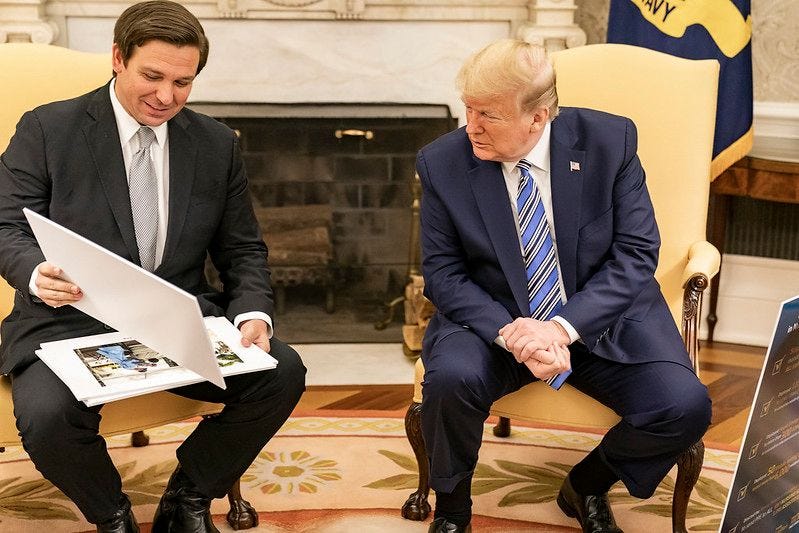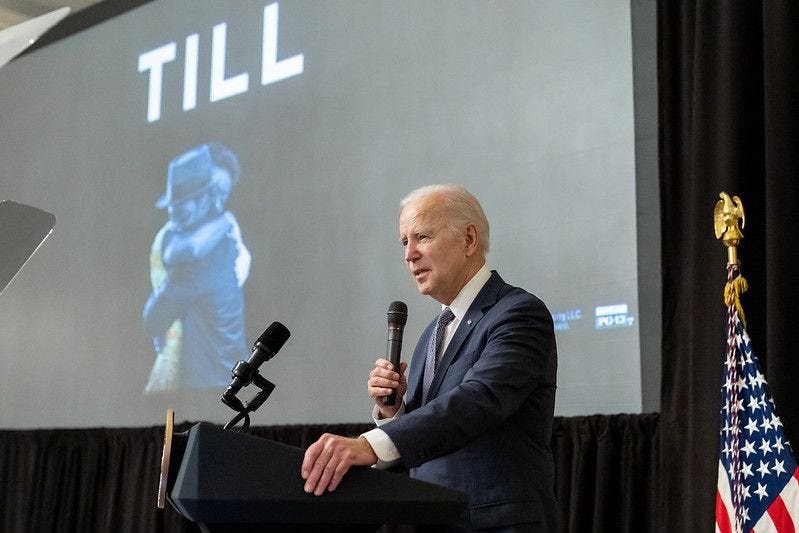Trump will not collapse on his own
Even if Donald Trump is convicted, there is no invisible hand that will yank him from the GOP stage.
Good morning! It’s Tuesday, July 25, 2023. The 2024 elections are 469 days away. If this newsletter was forwarded to you, subscribe here. If you want to contribute to support my work, donate here.
Let’s start off this morning with a question I recently received from a reader, in response to a piece of mine noting that Donald Trump’s GOP rivals — including Ron DeSantis — have been unusually hesitant to attack Trump, at least to the level you’d normally expect from underdog primary candidates seeking to displace a frontrunner.
Peter S. asks: Isn’t DeSantis’ campaign strategy 100% rational and correct if his true goal is to be first in line if Trump collapses, either physically or as a result of mounting legal problems (e.g., convicted in the NY case, while fighting the three other likely indictments)? DeSantis will needle Trump, but since his main goal (in my opinion) is to pick up Trump’s voters if Trump falters, he won’t actively engage him. DeSantis is too smart to believe he can bring Trump down, particularly without confronting him, and I believe he is simply keeping the door open in case the primary race becomes Trumpless.
First off, I do want to acknowledge the complexity of the situation faced by DeSantis and his fellow GOP contenders. As I wrote yesterday, it is genuinely hard to know how they should position themselves; Trump is currently polling so high among every ideological faction within the party that there is little room left for his rivals to stake out.
To Peter’s point, there are also strategic reasons to be cautious about how they attack Trump, since they can’t afford to anger too many of his voters, which would guarantee a loss in the primaries, as well as in the general election if they become the nominee. At the primary stage, these candidates need to be careful to coax Trump voters over without offending them — but winning the nomination will require giving at least some of those voters a reason to leave Trump’s side, which means building some sort of case against the former president.
If there is no way for Trump’s rivals to do that, then there is no reason for them to run. Because let’s be clear: Trump will not simply collapse of his own accord.
Peter mentioned two possible avenues of collapse: physical and legal. I won’t touch on the first one here, since there is no evidence Trump is in any sort of imminent physical danger. Yes, as with Biden, anything could happen at any time; but until there are actual signs of threats to their health, there’s no reason to speculate. There certainly isn’t enough there for DeSantis or anyone else to hang their campaign chances on.
On the other hand, Trump does face real legal threats. He has already been indicted twice, in New York for falsifying business records and federally for mishandling classified documents; two more indictments appear on their way, both related to his efforts to overturn the 2020 election.
If convicted, Trump could be staring down the barrel at years in prison. However, Trump’s legal threats are only a threat to his obtaining the Republican nomination if his rivals make it so. They still face the same quandary — convincing his voters to desert him — whether he is convicted or not; a conviction does not mean Trump automatically surrenders his chances at becoming president.
He would still be qualified to run, since there is nothing in the Constitution that says a convict cannot be president. (Indeed, convicts have run in the past, most famously Eugene Debs in 1920.) I also don’t find it particularly likely that he would drop out; if anything, like the indictments, a conviction would probably strengthen his support and add motivation to continue running, since he can try to pardon himself if elected. (It remains an open question whether he could self-pardon, but at that point, it would likely be his best chance to overturn the conviction.)
Finally, here’s the biggest obstacle to the possibility that a Trump conviction would erase his ability to become the Republican nominee: the trials are simply too late in the primary process. His New York trial is currently scheduled for March 25; for the purposes of this piece, let’s assume it begins then, even though it could be delayed and start even later. (It certainly won’t be pushed earlier.)
By March 25, more than 50% of the Republican delegates will already have been awarded; Trump could already be the presumptive nominee by then, or at least in striking distance. Crucially, the New York trial will take place after Super Tuesday, on March 5, when one-third of the GOP delegates will be up for grabs in a single day. (The two most delegate-rich states, California and Texas, will both vote on Super Tuesday, a first for a Republican primary.)
Partially due to the Republican primary rules, if Trump remains the frontrunner, his delegate haul by March 25 could be considerable. Unlike Democrats, who hold only proportional primaries (meaning, at a simplified level, if a candidate wins 30% of the state’s primary vote, they win 30% of the state’s delegate), many states hold winner-take-all or winner-take-most primaries on the Republican side. That means, in a crowded field, a candidate could win 30% of a state’s primary vote and 100% of the state’s delegates. In winner-take-all Florida for example, Trump could win 30% of the vote and DeSantis could be just behind him at 29% (with the rest distributed among the other candidates), but Trump would still walk away with all 125 Florida delegates. (Trump’s team has wisely spent the last few years persuading more states to hold winner-take-all or winner-take-most primaries for this very reason.)
Winner-take-all primaries especially benefit frontrunners if many of their rivals remain in the race, splitting up the vote: that’s why Mitt Romney encouraged the GOP field to consolidate behind one Trump alternative by February 26 in a Wall Street Journal op-ed yesterday. Still, even if the other candidates take Romney’s advice and only DeSantis (or someone else) is left by the New York trial, more than half of the GOP’s delegates will be awarded by then, making it too late in the game for Trump’s opponents to stake their chances on.
It should also be noted that the New York case is widely seen as the weakest one against Trump — the case least likely to secure a conviction, and also the one least likely to persuade Republican voters to oppose him. By the time the more serious documents trial kicks off on May 20 (assuming it is not later), at least 60% of the Republican delegates will be awarded; it could already be mathematically impossible for any of Trump’s rivals to win the nomination by then.
So don’t count on Trump’s path to the nomination simply disappearing if he is convicted. Yes, a Trump conviction would be historic. But what happens next? How do you go from Point A to B? A conviction does nothing to disqualify Trump from the GOP nomination, so nothing in the primary will change automatically. There is no mechanism for a sudden collapse, no invisible hand that will yank Trump from the stage. Maybe the other Republican candidates will not need a Trump conviction to defeat him — but if they do want his legal troubles to hurt him, they will have to proactively be the ones to make it happen.
The indictments will only have an impact if Trump’s rivals use them as a bludgeon to attack him with, and if Republican voters are successfully persuaded by that argument. And because the trials are so late in the primary process, if his rivals want a possible conviction to have an impact, they will have to start seeding the ground now, not in late March or early April, after so many delegates have been given away.
So far, DeSantis and the other major candidates have largely defended Trump from the indictments, priming the GOP base to dismiss a conviction if one is handed down. They are waiting for a collapse that will never come, at least not on its own.
More news to know.

Ron DeSantis was involved in a car accident this morning while traveling in Tennessee. “He and his team are uninjured,” according to a spokesman.
Chinese foreign minister Qin Gang, who had disappeared from public view for the last month, was abruptly ousted this morning. He was replaced by Wang Yi, who previously served as China’s top diplomat from 2013 to 2022.
The Justice Department sued Texas Gov. Greg Abbott over a floating barrier in the Rio Grande installed to deter migrants.
Kevin McCarthy told Sean Hannity that the House GOP’s investigation into the Biden family is “rising to the level of impeachment inquiry,” his farthest-reaching comments yet on a possible impeachment.
President Biden tapped longtime congressional staffer Shuwanza Goff as his new legislative liaison. Kevin McCarthy went on record to praise her, a sign of her deep relationships on both sides of the aisle.
One of Hunter Biden’s pricey paintings was sold to a Democratic megadonor who his father has appointed to a presidential commission. The younger Biden was aware of the buyer’s identity, per Business Insider, despite promising that he would not learn who was purchasing his art to avoid potential conflicts.
The day ahead.
At the White House: President Biden will use his powers under the Antiquities Act of 1906 to protect federal lands with historic or scientific significance. The new “Emmett Till and Mamie Till-Mobley National Monument” will encompass three sites in Illinois and Mississippi relevant to Emmett Till’s lynching. Till, who was killed at age 14, would be 82 years old today. Later in the day, Biden will also announce a new regulation aimed at increasing mental health coverage.
In the Senate: The upper chamber will continue consideration of its version of the National Defense Authorization Act (NDAA) for Fiscal Year 2024, a $886 billion military policy package. The Senate will vote on two bipartisan amendments: one by Sens. John Cornyn (R-TX) and Bob Casey (D-PA) requiring companies to disclose certain investments in China and Russia to the Treasury Department ahead of time, and another by Sens. Mike Rounds (R-SD) and Jon Tester (D-MT) to prohibit entities from China, Russia, Iran, and North Korea from buying U.S. farmland.
In the House: The lower chamber will vote on up to 13 pieces of legislation:
Securing the U.S. Organ Procurement and Transplantation Network Act
Protecting and Securing Chemical Facilities from Terrorist Attacks Act
Thanks for reading.
I get up each morning to write Wake Up To Politics because I’m committed to offering an independent and reliable news source that helps you navigate our political system and understand what’s going on in government.
The newsletter is completely free and ad-free — but if you appreciate the work that goes into it, here’s how you can help:
Donate to support my work or set up a recurring donation (akin to a regular subscription to another news outlet).
Buy some WUTP merchandise to show off your support (and score a cool mug or hoodie in the process!)
Tell your family, friends, and colleagues to sign up at wakeuptopolitics.com. Every forward helps!
If you have any questions or feedback, feel free to email me: my inbox is always open.
Thanks so much for waking up to politics! Have a great day.
— Gabe




